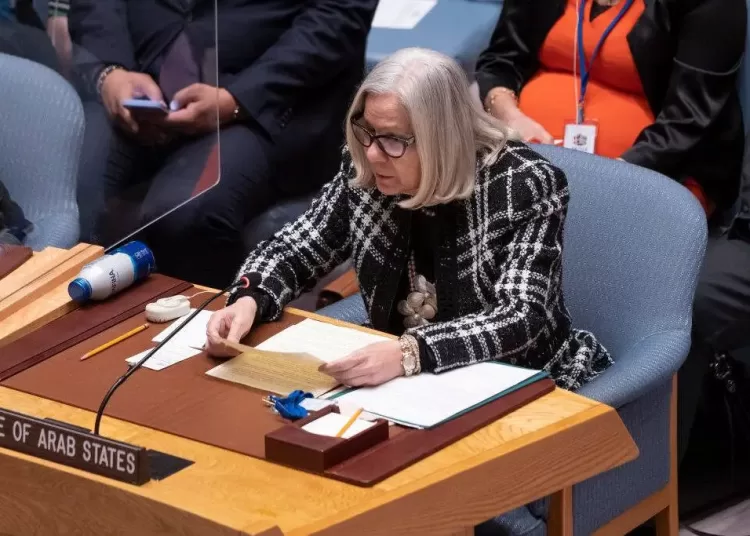CAIRO – Arab League Assistant Secretary General and Head of the Social Affairs Sector at the Arab League Ambassador Haifa Abu Ghazala condemned the crimes against humanity committed by Israeli occupation authorities in the Gaza Strip since last October, emphasising that the ongoing situation in Gaza is a blatant violation of all international conventions and norms. She pointed out to the complete failure of the international community to stop the brutal Israeli aggression against civilians, relief workers, and medical teams in the region as they carry out their humanitarian duties.
In a statement on Monday, on the occasion of World Humanitarian Day, Abu Ghazaleh denounced the continuing occupation power’s policy of starving civilians, preventing humanitarian aid from reaching those in need, and hindering the delivery of aid. She also condemned the ongoing and deliberate targeting of ambulances, hospitals, and medical centres, which suffer from severe shortages of medical staff, medicines, and supplies, and are operating with minimal resources.
She noted that the world commemorates “World Humanitarian Day” on August 19 each year, with this year’s theme being “For Humanity.” The United Nations is calling on those in power to end impunity, work for humanity, and stop targeting humanitarian workers, civilians, humanitarian assets, and civilian infrastructure. She added that UN reports indicate that 2023 has been the deadliest year on record for humanitarian workers, and 2024 is expected to be even worse.
Ambassador Abu Ghazaleh highlighted the risk of a polio outbreak in the Gaza Strip, which could threaten the lives of thousands of children in the region. She emphasised the urgent need to support the Palestinian Ministry of Health with vaccines and immunisations to combat the spread of this disease and to allow medical teams to move freely within the region to vaccinate children.
She reaffirmed the Arab League’s support for the United Nations Relief and Works Agency for Palestine Refugees in the Near East (UNRWA) and praised the agency’s role in Gaza despite the pressures it faces from the occupation power and attempts to hinder its work. She called on all international parties and donor countries to provide the necessary support to UNRWA.
Abu Ghazaleh also noted that on the day the world celebrates humanitarian work, approximately 25.6 million people in Sudan are facing severe hunger, more than half of the population, including over 755,000 people on the brink of famine, according to the Famine Early Warning Systems Network (FEWS NET).
She pointed out that relief workers in Sudan continue to face significant challenges in accessing humanitarian aid due to the ongoing conflict and lack of security. She warned that the collapse of the healthcare sector in Sudan due to the ongoing conflict has led to the spread of various diseases and epidemics, most recently the cholera outbreak in several areas since last month, amidst a shortage of cholera vaccines.
Ambassador Abu Ghazaleh called on the World Health Organization and all relevant parties to urgently provide the necessary vaccines to the Republic of Sudan to curb the spread of this deadly epidemic.
She also urged donors to provide more support for Sudan’s humanitarian appeal, which is estimated at dlrs 2.7 billion but has been funded only 32%, and to facilitate the delivery of urgent humanitarian aid to those in need across Sudan.
She mentioned that the Arab League’s General Secretariat recently received an urgent appeal from Yemen to assist those affected by the floods that hit the governorates of Al Hudaydah and Hajjah. The appeal called on regional and international partners and humanitarian organizations to support the Yemeni government’s efforts to address this disaster, which exceeds the government’s capacity in the affected areas.
The AL official called on all concerned parties to cooperate with the Yemeni government to provide relief to those affected and to support efforts to mitigate the impact of this humanitarian disaster.
She also noted that the Arab League’s General Secretariat is working to provide all forms of support through its various mechanisms, including specialized ministerial councils and affiliated organizations, to alleviate the difficult humanitarian conditions in some member states.
Abu Ghazaleh also praised the continuous and ongoing efforts of member states in supporting countries facing difficult humanitarian situations, helping to alleviate the suffering of those most in need of humanitarian assistance.
Meanwhile, she highlighted that in December 2008, the UN General Assembly designated August 19 of each year as World Humanitarian Day, in memory of the killing of the UN Secretary-General’s Special Representative in Iraq and 22 humanitarian workers.






Discussion about this post